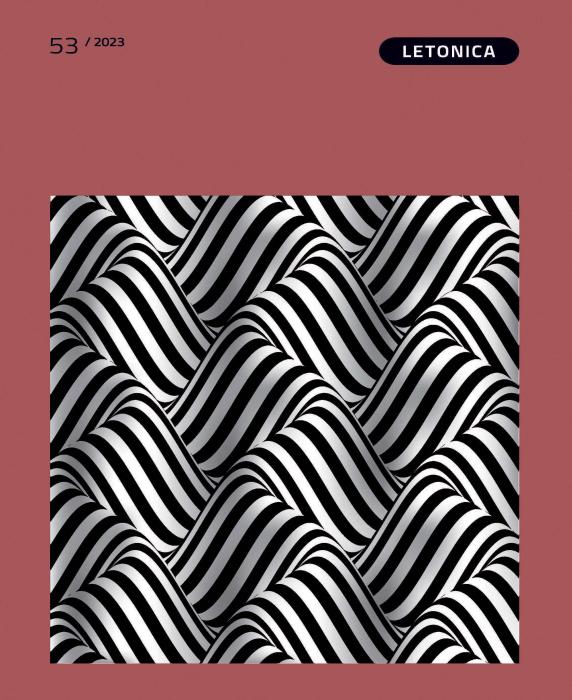The 53rd Issue of the Journal "Letonica" Published

The interdisciplinary academic journal Letonica (No. 53), published by the Institute of Literature, Folklore and Art of the University of Latvia (UL ILFA), brings together recent research in the humanities and social sciences and stimulates academic discussion on a wide range of topics.
Agita Lūse (Rīga Stradiņš University) in her article “Versions of Ethnography in 1930s–1940s Latvia: A Case Study of Ziedonis Ligers” examines the formation of ethnography as an academic discipline in Latvia and the fate of ethnologist Ziedonis Ligers (1917–2001), illustrating processes that shaped the discipline’s understanding during the interwar period. Ginta Pērle-Sīle (University of Latvia; UL ILFA), in “Principles of Material Selection in Baltic German Collections of Latvian Folk Songs in the First Half of the 19th Century”, focuses on the first collections of Latvian folk songs compiled and published by Baltic Germans. By comparing these collections with Latvju dainas, the author reflects on the possible affiliation of the included songs with Latvian traditions and rituals and provides insights into collection strategies and conditions.
Ilze Jansone (University of Latvia) in “Towards Syncretic Spirituality: Dimensions of Religiosity in Nora Ikstena’s Novel Ūdens mirdzēšana*” applies hermeneutic methods to analyze a recent Latvian prose work, focusing on the author’s use of “apologetics of imagination.” Laura Laurušaite (Institute of Lithuanian Literature and Folklore) in “The Role of Food in Identity Formation: Examples from Contemporary Latvian and Lithuanian Literature” explores food choices and culinary practices in literary works, suggesting that food can be used to examine the Soviet occupation, which profoundly shaped 20th-century Latvian and Lithuanian identity, as well as perestroika as an attempt to break free from foreign power. Ausma Cimdiņa (University of Latvia), in “The Apocalypse of the Soviet War Novel in Latvian Literature: Visvaldis Lāms’ Kāvu blāzmā*,” investigates the genre through Lāms’ well-known work, which represents the figure of the Latvian Legionnaire and portrays WWII from both the Latvian national and legionnaire perspectives.
Mārtiņš Kaprāns (Institute of Philosophy and Sociology, University of Latvia) and Jānis Tomaševskis (Latvian War Museum), in “Latvian Prisoners of War in Zedelgem: History, Memory, Conflict”, analyze the events and international resonance triggered by the monument to Latvian POWs unveiled in the Belgian town of Zedelgem in 2018.
The issue also features three articles in English. Elīna Veira (RTU Liepāja Academy), in “A Framework for Studying the Perception of Print-based Poems and Their Trans-medial Adaptations”, proposes a mechanism to study the reception of poetry and its transmedial adaptations and tests the model in practice. Sergejs Kruks (Rīga Stradiņš University), in “Ambiguous Grammar of Legal Discourse”, conducts a quantitative analysis of the Latvian legal corpus (1990–2022) using factor analysis, demonstrating the increasing use of ambiguous grammatical forms. Irina Pupure (Iryna Pupurs, T. Shevchenko Institute of Literature, National Academy of Sciences of Ukraine; former visiting researcher at UL ILFA), in “Latvian Literature in Ukraine: a Brief Overview of its Perception and Interpretation During the Last Hundred Years”, examines Latvian–Ukrainian literary connections, the history of translations, and encyclopedic entries on Latvian writers and their works published in Ukraine.
The literature review section features Vita Zelče’s (University of Latvia) review “175,000+ Latvian Biographies” of Andrejs Plakans’ monograph The Reluctant Exiles. Latvians in the West after World War II (Brill, Ferdinand Schöningh, 2021).
Editor-in-Chief: Jānis Oga. Literary Editors: Evelīna Zilgalve and Dace Strelēvica-Ošiņa (English). Design by Tatjana Raičiņeca. The issue has been published with the support of the State Culture Capital Foundation and the University of Latvia.
Letonica has been published since 1998 and features original, previously unpublished research in the humanities and social sciences. The journal is indexed in Scopus, ERIH PLUS, and EBSCO.
The journal is available online: Letonica issues.
Recent issues can also be purchased at major Latvian bookstores, the “Friends of the LNB” space at the National Library of Latvia, as well as at UL ILFA (Mūkusalas iela 3; more information: https://lulfmi.lv/izdevejdarbiba/apgads).